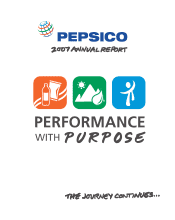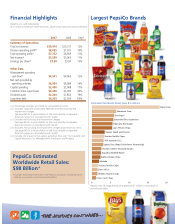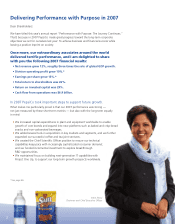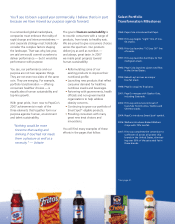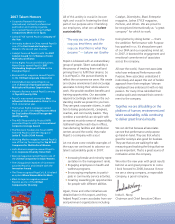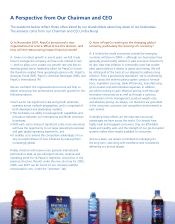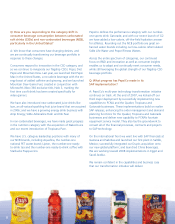Pepsi 2007 Annual Report Download - page 7
Download and view the complete annual report
Please find page 7 of the 2007 Pepsi annual report below. You can navigate through the pages in the report by either clicking on the pages listed below, or by using the keyword search tool below to find specific information within the annual report.
The second component of purpose
is environmental sustainability.
Companies — like individuals — must
act as custodians of our natural
resources. As it is for each individual, it
is a matter of moral urgency that
companies do what they can. But it is a
matter of business urgency too. Today,
recruiting the best people is difficult
without a good record on the environ-
ment — to say nothing of the direct
link between resource conservation and
business productivity.
Our stated goal is to further reduce
our water and energy usage and move
towards the ideal of “net neutral.” By
2015, corporate-wide, we will reduce
per-unit water consumption by 20%,
electricity consumption by 20% and
manufacturing fuel consumption
by 25% — as compared with our
consumption metrics in 2006. We
evaluate each project against return on
investment hurdles, but also consider
intangible benefits and longer-term
implications. Here are some of the
ways we continued to make real
progress in 2007:
• Reusing water from processing,
working with local communities to
provide access to clean water, and
supporting local farmers to deliver
“more crop per drop.”
• Incorporating consideration of envi-
ronmental sustainability issues and
opportunities as part of every capital
expenditure evaluation for projects
greater than $5 million.
• Using new technologies to save
energy, and working out ways
to communicate our conservation
efforts through brand marketing
activities.
• Offsetting the total purchased
electricity used by all PepsiCo
U.S.-based facilities, by purchasing
renewable energy certificates.
These initiatives pay. Since 1999,
Frito-Lay North America has reduced
per-pound water use by more than
38%, manufacturing fuels by more than
27%, and electricity by more than 21%,
thereby saving $55 million in energy and
utility costs compared with 1999.
As a result of these and many other
actions, detailed later in this report,
we earned inclusion in the Dow Jones
Sustainability Index (DJSI) in both their
North America and World Indices.
2007 Environmental Honors
• PepsiCo was added to DJSI World Index
and maintained its position on DJSI North
America Index.
• The U.S. Environmental Protection Agency
(EPA) recognized PepsiCo as Green Power
Partner of the Year and Energy Star
Partner of the Year.
• Working Mother magazine named
PepsiCo to its Best Green Companies for
America’s Children List.
• The Cause Marketing Forum awarded
Sam’s Club/Aquafina’s “Return the
Warmth“ program with the top
environmental honor, the Halo Award.
• CRO magazine recognized PepsiCo among
the 2007 100 Best Corporate Citizens in
the United States.
• PepsiCo was ranked #10 in the LOHAS
(Lifestyles of Health and Sustainability)
Index for its corporate social responsibility
program and communications.
• The China Association of Enterprises
with Foreign Investment (CAEFI) and
WTO Tribune Magazine honored PepsiCo
Investment (China) Ltd. with the Corporate
Social Responsibility Outstanding
Contribution Award.
• Frito-Lay’s Jonesboro facility received
the EPA Performance Track Distinction,
which recognizes facilities that set goals
for continuous improvements in
environmental performance.
• The U.S. Green Building Council
Leadership in Energy and Environmental
Design (LEED) program awarded LEED
Gold Status to the Gatorade Blue Ridge
facility in Wytheville, Virginia and
Gatorade Tolleson facility in Arizona.
• The Thailand Government Department of
Energy gave PepsiCo’s Thailand Lamphun
plant an Excellent Performance in Energy
Conservation Award.
• Frito-Lay was recognized in the EPA’s 2007
Water Efficiency Leader awards in
recognition for exceptional commitment
to water efficiency.
• Seven PepsiCo China bottling plants
were recognized as Best Water-Saving
Companies in China’s beverage industry
by the China Beverage Industry Association.
“ Your descendants shall gather your fruits.” — Virgil
5

